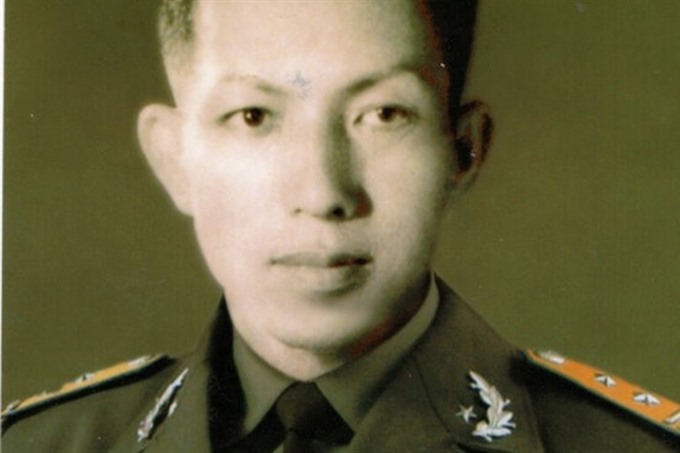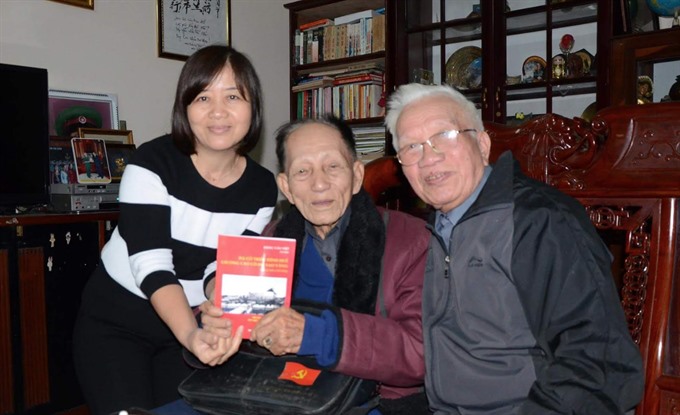 |
| Young fighter: This photo was taken when Dang Van Viet was serving in the Vietnamese People’s Army. File Photo |
Viet Nam News
by Huyen Nguyen
Having reached the milestone age of 100, Dang Van Viet still impresses with his gentle voice and vivid memories. His face is full or pride recalling the years he spent fighting the resistance war against French colonialists.
Viet left his prestigious family background to follow the revolution. He was born in Nho Lam Village in Dien Chau District in the central province of Nghe An in 1920. Both of his parents’ families were of noble descent – his maternal grandfather was Cao Xuan Duc, a minister of education and the author of many historical and geographical works; while his paternal grandfather was Dang Van Thuy, who managed the Temple of Literature, the first university in Viet Nam. His father was Dang Van Huong who was a minister during the reign of King Bao Dai (1926-1955).
Viet attended he Hue High School for the Gifted, and after graduation he studied at the Indochina School of Medicine (Ecole de Medecine de l’Indochine) in Ha Noi. In his third year, after the Japanese army coup d’etat against the French led to the closure of the school, he joined the Viet Nam Independence League in 1945.
That same year, together with another comrade, he was assigned to lower the flag of the Nguyen Dynasty (1802-1945) and hang the Viet Minh’s red flag with a gold star in the centre of Hue on August 21, 1945.
From July 1947, Viet’s military career moved to Highway 4, the most dangerous route in the battle zones in Cao Bang, Bac Kan and Lang Son and the border between Viet Nam and China.
He became the commander of Regiment 174 at the age of 27. Over the course of three years, he organised ambushes and attacked enemy posts along Highway 4 until victory was achieved in October 1950.
Regiment 174, under his direction, controlled the highway and won many resounding victories that frightened the French and earned Viet the alias the "Blue Tiger of Highway 4”.
As one of the first regiment chiefs of the Viet Nam People’s Army, together with a top-ranking general, Le Trong Tan, Viet posed a big question for the enemy.
Former French Colonel Charles de Pirey later wrote a letter to Viet, saying: “We were taken by surprise to discover later that the most dangerous enemy to us, the person who upset us most on Highway 4, was a 30-year-old man… To us, Dang Van Viet was an ingenious, dangerous and uncompromising rival but also a person who abided by international laws on prisoners of war...”
Losses
"I survived many battles and difficulties but never felt fear," Viet recalled.
Joining the revolution, the first person Viet lost was his lover.
His second loss was caused by the land reform programme in which the land owned by landlords were confiscated and redistributed to poor and landless peasants while the landlords and reactionaries were executed from 1953 to 1956 in northern Viet Nam. Viet’s family were mandarins for the Nguyen Dynasty, so his father was tied in front of the communal house, stripped of all possessions and land and died about two years later as his family had no money to pay for medicine.
Viet’s life has been full of ups and downs. After finishing his military career, he worked for the Ministry of Construction and Ministry of Fisheries. In his new position as a vice director, he still set an example as an enduring striver. At the age of 40, he attended the Ha Noi University of Science and Technology and graduated after five years.
In 1980, he retired and moved to a small apartment, growing fruit trees to make money for his family.
With his rich cultural and practical knowledge, Viet has written a number of best-selling books, including his memoir entitled Nguoi Linh Gia Dang Van Viet -- Chien Si Duong So 4 Anh Hung (The Old Soldier Dang Van Viet -- The Soldier of Heroic Highway 4) that has been translated into French, Duong So 4 Ruc Lua (Flaming Hightway 4), and his most recent book Nguoi Linh Gia Ke Chuyen Dan Toc Viet Nam 4,000 Nam Chong Xam Luoc (The Old Soldier Tells Stories of Vietnamese People’s 4,000 Year Fighting Against Invasions).
 |
| Comrades: This photo was taken when Viet (centre) paid a visit and presented his book to Lieutenant General Khuat Duy Tien (right). VNS Photo Huyen Nguyen |
A hero with no title
Summerising his military career, Viet recalled that he commanded 130 battles and won 116 of them.
His highest military rank was lieutenant colonel and he has never been awarded the title of Viet Nam People’s Army’s Hero.
“If I’ve been given the title, I think that Viet should have been awarded it five or ten times,” said hero La Van Cau.
Late General Vo Nguyen Giap also said: “There is no question about Viet’s talent and morality: creative in the military, steadfast in politics and a productive literary capacity.”
“Highway 4 is like a medal attached to Viet’s chest, confirming that he was good at fighting the enemy and minimising Vietnamese force’s losses. He set an example of a noble spirit that moved us to the bottom of our hearts,” Major General Cao Pha, who hung the Viet Minh’s flag in Hue with Viet, commented on his comrade.
Though the reason why Viet has yet to receive any honourable title has not been clarified, but people can still see the high spirit of the “Blue Tiger of Highway 4”.
"Some may question why I don’t feel discontent," he said. “I do not feel I was disadvantaged because I could travel by car when I was still in my mother’s belly, live in a big house, study at an international school and play with foreign friends while growing up.”
“My biggest aspiration was to drive off the colonialists and regain independence for the nation. After joining the revolutionary front, I was determined to fight, but I couldn’t have made it without President Ho Chi Minh and the Communist Party," he said.
“There would be both gains and losses, happiness and sadness, but I have gained more than I lost because I have had the whole nation and people with me. Like other Vietnamese, I sacrificed the small to gain the big things.
“My greatest happiness is being a general in the people’s hearts and the son of all kins, being honoured and recognised by the masses.” VNS
OVietnam